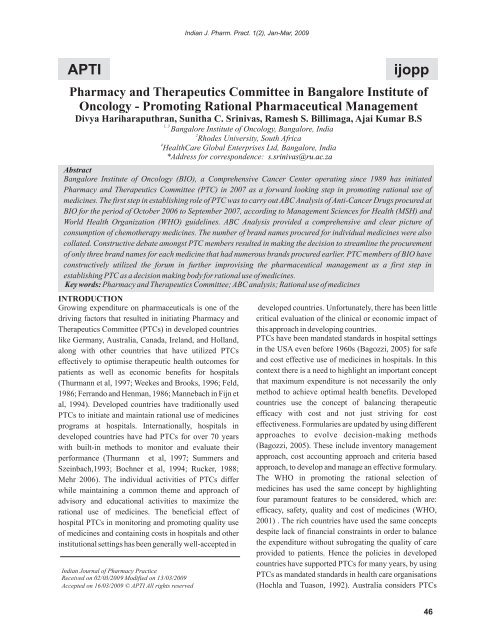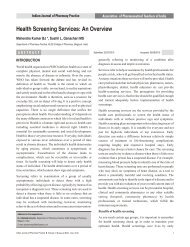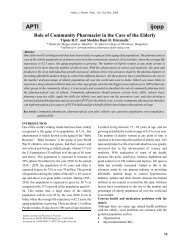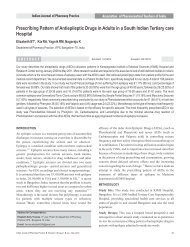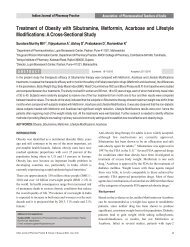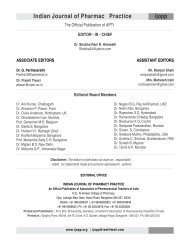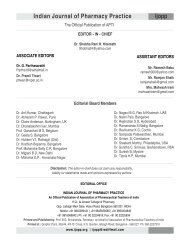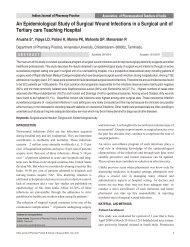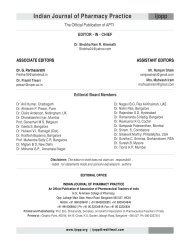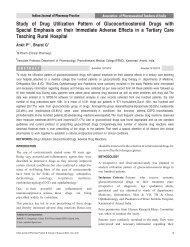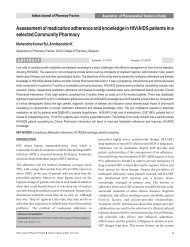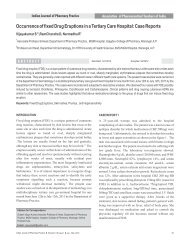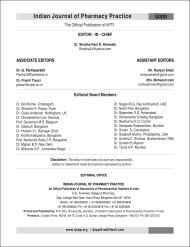<strong>Indian</strong> J. Pharm. Pract. 1(2), Jan-Mar, 2009<strong>APTI</strong>INTRODUCTIONGrowing expenditure on pharmaceuticals is one <strong>of</strong> thedriving factors that resulted in initiating <strong>Pharmacy</strong> andTherapeutics Committee (PTCs) in developed countrieslike Germany, Australia, Canada, Ireland, and Holland,along with other countries that have utilized PTCseffectively to optimise therapeutic health outcomes forpatients as well as economic benefits for hospitals(Thurmann et al, 1997; Weekes and Brooks, 1996; Feld,1986; Ferrando and Henman, 1986; Mannebach in Fijn etal, 1994). Developed countries have traditionally usedPTCs to initiate and maintain rational use <strong>of</strong> medicinesprograms at hospitals. Internationally, hospitals indeveloped countries have had PTCs for over 70 yearswith built-in methods to monitor and evaluate theirperformance (Thurmann et al, 1997; Summers andSzeinbach,1993; Bochner et al, 1994; Rucker, 1988;Mehr 2006). The individual activities <strong>of</strong> PTCs differwhile maintaining a common theme and approach <strong>of</strong>advisory and educational activities to maximize therational use <strong>of</strong> medicines. The beneficial effect <strong>of</strong>hospital PTCs in monitoring and promoting quality use<strong>of</strong> medicines and containing costs in hospitals and otherinstitutional settings has been generally well-accepted in<strong>Indian</strong> <strong>Journal</strong> <strong>of</strong> <strong>Pharmacy</strong> <strong>Practice</strong>Received on 02/03/2009 Modified on 13/03/2009Accepted on 16/03/2009 © <strong>APTI</strong> All rights reserved<strong>ijopp</strong><strong>Pharmacy</strong> and Therapeutics Committee in Bangalore Institute <strong>of</strong>Oncology - Promoting Rational Pharmaceutical ManagementDivya Hariharaputhran, Sunitha C. Srinivas, Ramesh S. Billimaga, Ajai Kumar B.S1, 3Bangalore Institute <strong>of</strong> Oncology, Bangalore, India2Rhodes University, South Africa4HealthCare Global Enterprises Ltd, Bangalore, India*Address for correspondence: s.srinivas@ru.ac.zaAbstractBangalore Institute <strong>of</strong> Oncology (BIO), a Comprehensive Cancer Center operating since 1989 has initiated<strong>Pharmacy</strong> and Therapeutics Committee (PTC) in 2007 as a forward looking step in promoting rational use <strong>of</strong>medicines. The first step in establishing role <strong>of</strong> PTC was to carry out ABC Analysis <strong>of</strong> Anti-Cancer Drugs procured atBIO for the period <strong>of</strong> October 2006 to September 2007, according to Management Sciences for Health (MSH) andWorld Health Organization (WHO) guidelines. ABC Analysis provided a comprehensive and clear picture <strong>of</strong>consumption <strong>of</strong> chemotherapy medicines. The number <strong>of</strong> brand names procured for individual medicines were alsocollated. Constructive debate amongst PTC members resulted in making the decision to streamline the procurement<strong>of</strong> only three brand names for each medicine that had numerous brands procured earlier. PTC members <strong>of</strong> BIO haveconstructively utilized the forum in further improvising the pharmaceutical management as a first step inestablishing PTC as a decision making body for rational use <strong>of</strong> medicines.Key words: <strong>Pharmacy</strong> and Therapeutics Committee; ABC analysis; Rational use <strong>of</strong> medicinesdeveloped countries. Unfortunately, there has been littlecritical evaluation <strong>of</strong> the clinical or economic impact <strong>of</strong>this approach in developing countries.PTCs have been mandated standards in hospital settingsin the USA even before 1960s (Bagozzi, 2005) for safeand cost effective use <strong>of</strong> medicines in hospitals. In thiscontext there is a need to highlight an important conceptthat maximum expenditure is not necessarily the onlymethod to achieve optimal health benefits. Developedcountries use the concept <strong>of</strong> balancing therapeuticefficacy with cost and not just striving for costeffectiveness. Formularies are updated by using differentapproaches to evolve decision-making methods(Bagozzi, 2005). These include inventory managementapproach, cost accounting approach and criteria basedapproach, to develop and manage an effective formulary.The WHO in promoting the rational selection <strong>of</strong>medicines has used the same concept by highlightingfour paramount features to be considered, which are:efficacy, safety, quality and cost <strong>of</strong> medicines (WHO,2001) . The rich countries have used the same conceptsdespite lack <strong>of</strong> financial constraints in order to balancethe expenditure without subrogating the quality <strong>of</strong> careprovided to patients. Hence the policies in developedcountries have supported PTCs for many years, by usingPTCs as mandated standards in health care organisations(Hochla and Tuason, 1992). Australia considers PTCs46
pivotal to the rational use <strong>of</strong> medicines (Weekes and This article describes initiatives in rationalBrooks, 1996) and it has been shown that effective PTCs pharmaceutical management as a part <strong>of</strong> the newlyplay a very active part in educational, communication initiated PTC's activities <strong>of</strong> Bangalore Institute <strong>of</strong>and advisory roles when clinicians, pharmacists and Oncology (BIO). BIO was founded in 1989 as thenursing representatives work together with flagship unit <strong>of</strong> Banashankari Medical and Oncologyadministrative personnel on PTCs. Based on this proven Research Center Ltd (BMORC). BMORC, initiallyevidence from developed countries, some developing incorporated as a Private limited Company on 13countries such as Brazil (Cruz and Paola, 2006) and Laos November 1986, became a public limited company in(Vang, 2006) have actively adopted the concept <strong>of</strong> PTCs 1992. It was the first private Comprehensive Cancerin their hospitals to advocate rational therapeutics that Hospital in Bangalore and Karnataka. The idea for such apromote evidence-based medicine along with clinical hospital was initiated and is managed, by like-mindedeffectiveness and not just cost effectiveness.and dedicated cancer specialists who realized that thePharmaceutical management as proposed by theexisting facilities in the government hospitals were notManagement Sciences for Health (MSH) (Quick et al,sufficient to meet the demands and the private sector1997) and the World Health Organization (WHO)needed to step in. BMORC manages and operates BIO, ainvolves four functions: Selection, Procurement,comprehensive cancer center which started its services inDistribution and Use. This cycle requires support <strong>of</strong> legal1989 with 5 consultants and 30 beds. It is now a 145-bedand policy framework as well as management supporthospital with over 60 consultant physicians and a staffthat comprise financing, information management,strength <strong>of</strong> 546 people. BIO treats nearly 3000 newhuman resources and organization. Analytical techniquescancer patients every year, and around 110 patientsare designed in developed countries and cost-consciousreceive radiotherapy every day. Besides, the dailycountries to identify and control excess costs inoutpatient attendance exceeds 300. Nearly 1800 majorpharmaceutical management. Even by the 1980s,operations are performed every year. These numbers aredeveloped countries spent about 100 times as much onever increasing.health and 20 times as much on pharmaceuticals, on a perBIO's PTC was initiated in October 2007, with thecapita basis, when compared to developing countriesobjective <strong>of</strong> promoting rational use <strong>of</strong> medicines. The(Patel, 1983) and this trend continues to be predominant.PTC is a standing hospital committee responsible,Hence, industrialized countries have adopted techniquesthrough its chairman, to the Hospital executive board. Itto contain costs. This resulted in techniques such as ABCis a policy recommending body to the medical staff andanalysis and Therapeutic Category analysis to quantifyadministration <strong>of</strong> the hospital on matters related to thecosts and identify areas where costs could be reducedtherapeutic use <strong>of</strong> drugs. Improved health and economic(Quick et al, 1997; Quick 1982). Cost reducing strategiesoutcome <strong>of</strong> the hospital care, particularly those related toare aimed at increasing the effectiveness and efficiencythe medication remains the core objective <strong>of</strong> the PTC.<strong>of</strong> pharmaceutical supply.MethodologyABC analysis is also known as Pareto analysis. It is a<strong>Pharmacy</strong> and Therapeutics Committee <strong>of</strong> BIO decidedwell-known method in inventory management, and is ato use the concept <strong>of</strong> ABC Analysis for rationalizing theuseful tool in analyzing consumption patterns and thedecisions <strong>of</strong> pharmaceutical procurement <strong>of</strong>value <strong>of</strong> total consumption. A Canadian study highlightsAntineoplastic medicines to start with.the extent to which cost effectiveness evaluation is aABC analysis ranks a set <strong>of</strong> pharmaceuticals byuseful input in decision-making moving beyondcalculating the expenditure on each medicine as aexamining budgets and towards broader balancedpercentage <strong>of</strong> the total expenditure on all medicines in thebenefits <strong>of</strong> therapeutic outcomes with economicset. It is a method advocated by WHO and MSH foroutcomes (Dugal et al, 2002). This approach is a directassembling data to determine where money is being spentconsequence <strong>of</strong> growing concern about rising health care(Quick et al, 1997).costs due to pharmaceuticals as the main component <strong>of</strong> a. All items purchased are listed according to year andexpenditure (Levy and Gagnon, 2002; Fernandes, 2002). unit cost.Cost-cutting strategies from policy makers, hospital b. Consumption quantities for each are entered.administrators, and health care pr<strong>of</strong>essionals generally c. Value <strong>of</strong> consumption is calculated for each bytargeted pharmaceutical expenditures first.multiplying the unit cost by the number <strong>of</strong> units47
- Page 1: Indian Journal of Pharmacy Practice
- Page 4 and 5: Indian Journal of Pharmacy Practice
- Page 7 and 8: APTIIndian J. Pharm. Pract. 1(2), J
- Page 10 and 11: Indian J. Pharm. Pract. 1(2), Jan-M
- Page 12 and 13: Indian J. Pharm. Pract. 1(2), Jan-M
- Page 14 and 15: APTIijoppGenesis, Development and P
- Page 16 and 17: Indian J. Pharm. Pract. 1(2), Jan-M
- Page 19 and 20: Indian J. Pharm. Pract. 1(2), Jan-M
- Page 21 and 22: Indian J. Pharm. Pract. 1(2), Jan-M
- Page 23 and 24: Indian J. Pharm. Pract. 1(2), Jan-M
- Page 25 and 26: Indian J. Pharm. Pract. 1(2), Jan-M
- Page 27 and 28: Indian J. Pharm. Pract. 1(2), Jan-M
- Page 29 and 30: Indian J. Pharm. Pract. 1(2), Jan-M
- Page 31 and 32: Indian J. Pharm. Pract. 1(2), Jan-M
- Page 33 and 34: Indian J. Pharm. Pract. 1(2), Jan-M
- Page 35 and 36: Indian J. Pharm. Pract. 1(2), Jan-M
- Page 37 and 38: Indian J. Pharm. Pract. 1(2), Jan-M
- Page 39 and 40: Indian J. Pharm. Pract. 1(2), Jan-M
- Page 41 and 42: Indian J. Pharm. Pract. 1(2), Jan-M
- Page 43 and 44: Indian J. Pharm. Pract. 1(2), Jan-M
- Page 45 and 46: Indian J. Pharm. Pract. 1(2), Jan-M
- Page 47 and 48: Indian J. Pharm. Pract. 1(2), Jan-M
- Page 49 and 50: Indian J. Pharm. Pract. 1(2), Jan-M
- Page 51: Indian J. Pharm. Pract. 1(2), Jan-M
- Page 55 and 56: .leadership” (Cohen, 1984). A stu
- Page 57 and 58: Indian J. Pharm. Pract. 1(2), Jan-M
- Page 59 and 60: Indian J. Pharm. Pract. 1(2), Jan-M
- Page 61 and 62: Indian J. Pharm. Pract. 1(2), Jan-M
- Page 63 and 64: Indian J. Pharm. Pract. 1(2), Jan-M
- Page 65 and 66: Indian J. Pharm. Pract. 1(2), Jan-M
- Page 67 and 68: Indian J. Pharm. Pract. 1(2), Jan-M
- Page 69 and 70: Indian J. Pharm. Pract. 1(2), Jan-M
- Page 71 and 72: Indian J. Pharm. Pract. 1(2), Jan-M
- Page 73 and 74: Indian J. Pharm. Pract. 1(2), Jan-M
- Page 75 and 76: Indian J. Pharm. Pract. 1(2), Jan-M
- Page 77 and 78: Indian J. Pharm. Pract. 1(2), Jan-M
- Page 79 and 80: Indian J. Pharm. Pract. 1(2), Jan-M
- Page 81 and 82: Indian J. Pharm. Pract. 1(2), Jan-M
- Page 83 and 84: Indian J. Pharm. Pract. 1(2), Jan-M
- Page 85 and 86: Indian J. Pharm. Pract. 1(2), Jan-M
- Page 87 and 88: Indian J. Pharm. Pract. 1(2), Jan-M
- Page 89 and 90: Indian J. Pharm. Pract. 1(2), Jan-M
- Page 91 and 92: Indian J. Pharm. Pract. 1(2), Jan-M
- Page 93 and 94: Indian J. Pharm. Pract. 1(2), Jan-M


